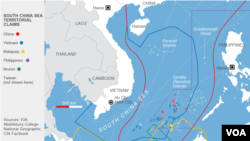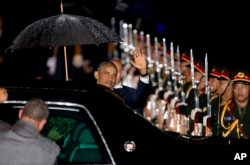U.S. President Barack Obama's three-day visit to Laos this week shows how far the Southeast Asian country of nearly 7 million people has stepped out of the shadows of its influential neighbors, China and Vietnam.
Since the days of French colonial Indochina, Laos has been politically and culturally influenced by Vietnam. By the time of the 1975 communist revolution, most Lao party officials had spent a substantial period of time in Vietnam and many even spoke fluent Vietnamese.
However, Nguyen Ngoc Truong, a former Vietnamese senior diplomat who runs a foreign policy think tank, said Hanoi today considers Laos "a very important neighbor" — even if China's enormous development aid packages in Laos appear to give Beijing the upper hand.
"It should not be stated that Laos has fallen into China's orbit," he said. "Vietnam is aware of Laos' situation, in which it is greatly influenced by Beijing, due to the Southeast Asian nation's huge receipt of China's aid."
He said the "South China Sea issue is just one part of the relations and it does not impact the diverse and multifaceted ties between Laos and Vietnam." He referred to criticism that Laos — together with China-friendly Cambodia and Myanmar — has blocked ASEAN consensus on how to address Beijing's increasingly assertive posture in the territorially disputed maritime region. Laos, which is landlocked, has remained largely neutral on the matter.
According to Chinese state media, Beijing's foreign direct investment in Laos exceeded $1 billion in 2015. Vietnam's comparatively small foreign direct investment in Laos, Truong said, can't counterbalance what he describes as Beijing's "economic invasion" of Laos.
Ho Cam Gioi, of the Center for Southeast Asian studies in Ho Chi Minh City, said Vietnamese nationals are still interested in Laos and its language, but that the level is low.
"Some want to learn Laotian language to travel to the country to study, to do business and to resettle there with their family," Gioi said.
Prior to this week's summits, Laos and Vietnam held numerous high-level meetings in which, according to the Voice of Vietnam, "the special solidarity of Vietnam and Laos [proved] an invaluable asset."
Past U.S. involvement
In Laos, Obama will wrestle with the ghosts of past U.S. policies.
In the 1960s and 1970s, the U.S. rained bombs on Lao villages and the countryside as America's war with Vietnam spilled across the border. The Lao government estimates that more than 2 million tons of ordnance were released during more than 500,000 missions — one bomb every eight minutes for nine years.
An estimated 80 million cluster bombs did not explode, leaving tennis ball-sized "bombies" littering the impoverished countryside to wound and kill unsuspecting people.
Obama planned to acknowledge this history and its damaging effect on Laos' development, tourism and agriculture. He is expected to announce additional aid to clean up unexploded ordnance, while the Lao government is expected to offer help in accounting for missing and dead U.S. service members.
This article was produced in collaboration with VOA's Vietnamese Service. Some information is from AP.









